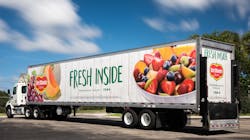Del Monte commits to net-zero emissions goal
Del Monte Foods recently pledged to achieve net-zero emissions by 2050, putting the company in line with the Science Based Targets Initiative’s (SBTi) Net-Zero Standard.
To achieve this goal, the company says it also committed to define near-term science-based targets to reduce Scopes 1, 2 and 3 carbon emissions that support SBTi’s focus on limiting global temperature rise to 1.5°C.
Aligning with SBTi gives the company a clearly defined and measurable path to not only achieve its long-term goal of net-zero emissions by 2050, but also drive near-term and consistent progress for reducing emissions across its supply chain, according to Del Monte. Science-based targets provide companies with an established approach, including 2030 milestone goals, to reduce emissions that also support the Paris Agreement.
“As ‘Growers of Good,’ creating a healthy and more hopeful tomorrow has been at the core of Del Monte Foods’ purpose for over 130 years,” said Greg Longstreet, president and CEO of Del Monte Foods. “Committing to a net-zero emissions goal, aligned with SBTi, extends our environmental sustainability commitments and gives us aggressive and measurable milestones to reach as we strive to nourish the planet, people, and communities for many generations to come.”
To achieve its net-zero goal, Del Monte Foods plans to reduce or eliminate the majority of its existing emissions rather than purchase external carbon credits to offset emissions. This approach is also aligned with SBTi’s requirement that registered companies reduce at least 90% of baseline emissions, minimizing the use of carbon credits.
Del Monte Foods reports it already has made strides on its path to decarbonization, including:
- Streamlining its operations footprint to maximize output and eliminate unnecessary emissions from facilities operating at less than full capacity.
- Doubling its capital investment in production operations over the past three years to add automation and other technologies for improved efficiency and reduced waste.
- Investing in renewable energy, including installing a 3MW solar array at its Hanford, Calif., facility, one of the company’s largest sites.
- Increasing the use of rail by 20% over the past year, while optimizing truck transportation by increasing average truck miles per gallon by 14.3%.
- Reducing food waste, including diverting more than 25 million pounds of food from landfills over the past two years through a focus on upcycling and food donations.
As it strives for net-zero emissions, Del Monte plans to continue investing in key areas to aggressively reduce carbon emissions in both direct and indirect operations, including renewable energy, automation technology, transportation efficiency, earth-friendly packaging innovation, and regenerative agricultural practices in partnership with its network of U.S.-based, multi-generational growers.
“It’s exciting to be aligned with the most aggressive path to net-zero,” said Molly Laverty, environmental, social and governance (ESG) senior manager at Del Monte. “The food industry has an important role to play in reducing greenhouse gas emissions, and Del Monte Foods is committed to doing all we can to accelerate progress.”
Now that Del Monte has registered its net-zero commitment with SBTi, it will develop specific 2030 emissions reduction targets aligned with SBTi criteria, which will be presented to SBTi for official validation. Once validated, Del Monte will publicly announce these targets, as well as report company-wide emissions and progress against these targets each year.
